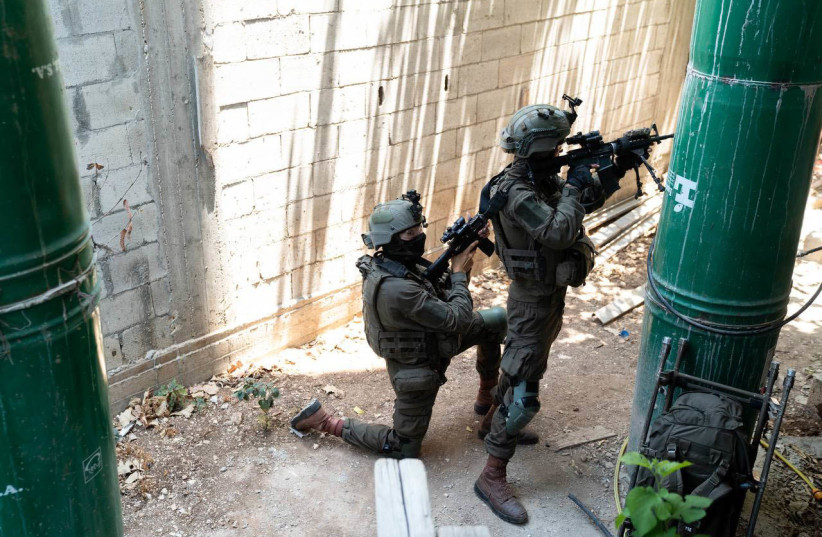What if the Palestinian Arab city of Jenin, a notorious hotbed of terrorism, was in an independent State of Palestine?
What would happen if Israeli forces needed to strike at terrorists in “Jenin, Palestine,” rather than in the Jenin of today, which is part of the autonomous Palestinian Authority regime, not part of a sovereign state?
This isn’t a matter of idle speculation. It’s a vital life-and-death question for the people of Israel.
Back in the 1990s, some starry-eyed supporters of the Oslo Accords believed that a “new Middle East” was dawning, in which Palestinian terrorism was ending and Israel would no longer have to remain constantly on military alert. They claimed that the Palestinian Authority, with its American-trained and American-armed security forces, would fulfill its promise to stamp out any remaining terrorists.
More realistic observers, however, feared precisely the kind of situation that Israel now faces – in which the PA would shelter and subsidize terrorists, and Israel would be forced to chase after the terrorists, into PA territory, again and again.

Throughout the 30 years since the signing of the first Oslo agreement on the White House lawn, the Palestinian Arabs and their supporters have been demanding that the autonomous PA regions be expanded and transformed into a full-fledged, sovereign state of “Palestine” in all of Judea-Samaria. So, it’s fair to ask: How would things look today if that advice had been followed?
The key word is “sovereign.” A fully sovereign state has internationally recognized borders. If a country sends its troops across another country’s border, that’s war.
Imagine this scenario:
Soon after the State of Palestine is established, Palestinian Arab terrorists shoot some Israelis and then run to Jenin to hide. Or terrorists based in Jenin fire their newly developed rockets into nearby Israeli towns.
Israel appeals to the government of Palestine to take action. President Mahmoud Abbas – still serving his never-ending four-year term – responds that he is doing his best to catch the terrorists, but they’re just so darn hard to track down. Plus, it’s only “a few extremists.” And besides, the “real” problem is Israel’s occupation of... something.
That leaves Israel no choice but to send its troops across the border into “Palestine” to eliminate the terrorists.
The major international media networks immediately bombard the American public with reports portraying Israel as an aggressor. Palestinian children are shown cowering in fear as menacing-looking Israeli armored vehicles rumble by. Christiane Amanpour interviews weeping Jenin housewives. Thomas Friedman announces that Israel is “losing its soul.”
Then the members of the “Squad” spring into action. Rashida Tlaib, Ilhan Omar, and like-minded colleagues suddenly are on all the major television and radio talk shows, denouncing “Israel’s outrageous violation of Palestinian sovereignty.”
Right on cue, J Street and Americans for Peace Now urge the Biden administration to “restrain” Israel’s “provocative” actions. Media outlets then use those statements to manufacture stories about how American Jews are “deeply divided” over Israel’s methods.
Soon the United Nations Security Council convenes an urgent session. After all, this is no longer a limited police action in an autonomous zone – it’s an invasion of a foreign country. Council members demand the imposition of international sanctions. The Biden administration lets it be known that unless the Israelis pull back from Jenin, the US will be “unable to protect” Israel from “the force of international public opinion.”
Does anything about this scenario seem implausible? Or even unlikely?
Every time a terrorist strikes and then runs into that Jenin, the Israelis would be confronted with the same dilemma: if they violate the border of the State of Palestine, they would face relentless condemnations from around the world, political and diplomatic pressure, and the likelihood of sanctions.
So yes, Israel’s current situation is messy. Rooting out the Jenin terrorists will take time. There will be some unkind headlines, and some rude criticism from obnoxious talking heads. But things would be worse, much worse, if Jenin was in “Palestine.”
The writer is president-elect of the Religious Zionists of America. He is the father of Alisa Flatow, who was murdered in an Iranian-sponsored Palestinian terrorist attack in 1995, and is the author of A Father’s Story: My Fight for Justice Against Iranian Terror.
